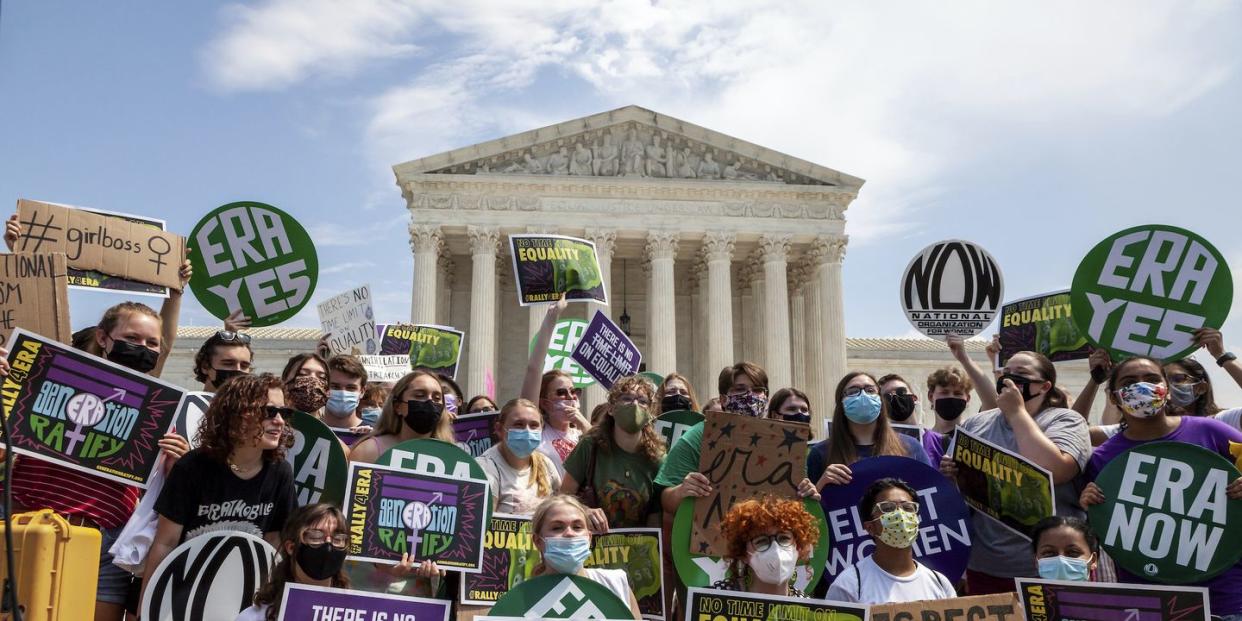Kate Kelly on Fighting for Abortion Access After the Overturn of Roe v. Wade

"Hearst Magazines and Yahoo may earn commission or revenue on some items through the links below."
This morning after the U.S. Supreme Court dropped the decision in Dobbs v. Jackson Women's Health Organization, I packed a go-bag and ran over to the court. There were a few hundred people gathered on First Street NE in front of the court. The sidewalk and plaza, normally available to the public, were blocked off with an eight-foot-high metal barricade. I started passing out signs from Shout Your Abortion, a group I work with. The most popular sign was I WILL AID AND ABET ABORTION.
The reason this sign is of significance is that everyone—and I do mean everyone—who cares about freedom must now become an abortion activist. With 26 states poised to ban abortion immediately and in the coming weeks, abortion is now a community responsibility. The anti-abortion justices on the Supreme Court have demolished the human rights of over 170 million Americans. Since the court went all-in, destroying 50 years of precedent, we have to move swiftly to support other channels of care.
It doesn’t matter how much you know about abortion, or if you’ve ever been involved before—you can join the fight for abortion access.
You can become an active participant in fighting for reproductive freedom by taking the following specific steps, right now:
Share information about the safety and availability of abortion pills (mifepristone and misoprostol). Abortion via pills is the most common type of abortion in the United States, and are effective at least up to 10 weeks. Anyone in the USA can get abortion pills mailed to them no matter where they live. An organization called Aid Access does “advanced provision,” which means you don’t have to be pregnant to get them! If you can get a letter in the mail—you can get abortion pills.
Find and support local abortion funds. Abortion funds exist in all 50 states already and help people who cannot otherwise afford abortions get the care they need. They will be a vital resource in the coming weeks and months.
Support independent abortion clinics, who provide most care later in pregnancy and are already being overwhelmed with out-of-state patients as state abortion bans continue to pass. Independent clinics are often the only care providers left in states where people are losing access.
Become a visible, vocal supporter of abortion access. Together, we must let the world know that we will not obey unjust laws, we will care for each other no matter what, and that our right to autonomy is not debatable. We reject the legitimacy of any and all abortion bans, and we promise to disobey them.
In addition to helping shore up abortion access in your community in the immediate aftermath of the Dobbs decision, we must also fight for a comprehensive fix.
So what is the comprehensive fix that can save and expand abortion access?
It’s the Equal Rights Amendment.
ERA opponents know this and refer to it as the “Everything Related to Abortion” amendment. In the contemporary fight for the ERA, proponents have also begun to speak with candor about its potential to save abortion access. We do not have to speculate on whether a fully ratified federal ERA could protect the right to access abortion.
The New Mexico Constitution protects the right to choose to a greater extent than the U.S. Constitution does, because it already has a state-level ERA. In the case of New Mexico Right to Choose/NARAL v. Johnson, under the state ERA, the New Mexico Supreme Court struck down a law that prohibited medical coverage of abortion. Other states have had similar successes under their state-level ERAs, and this has positive implications for abortion litigation on the federal level with an ERA in place. In addition to shoring up abortion access in court, the federal ERA would also provide a constitutional hook for Congress to pass more progressive laws that not only codify Roe but move beyond the now-demolished privacy framework to make abortion more accessible to all.
Americans, collectively, need to get creative about winning back our fundamental rights and freedoms by changing the U.S. Constitution, while simultaneously making sure that those who need abortions right now get them and are safe. It’s time for bold solutions and deep movement building. We now know with certainty that the Supreme Court won’t save us—but we will save us.
Kate Kelly is an attorney and author of Ordinary Equality: The Fearless Women and Queer People Who Shaped the U.S. Constitution and the Equal Rights Amendment.
You Might Also Like
